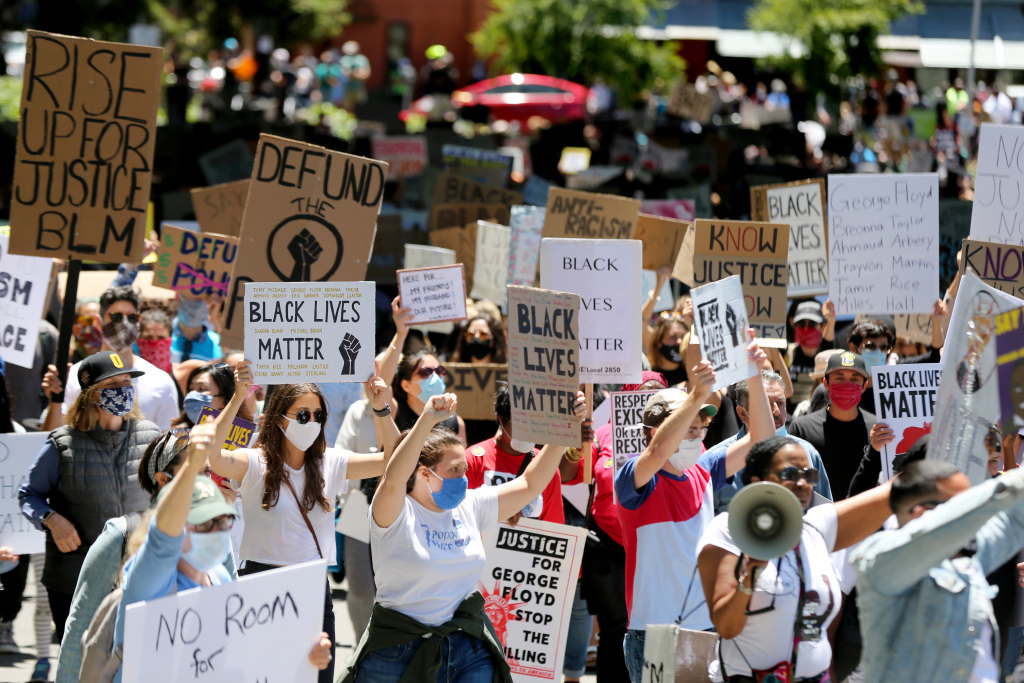Nearly three weeks after the police killing of George Floyd in Minneapolis, protesters continued to march in the streets across the Bay Area Saturday, from San Francisco to Morgan Hill.
What started out as protests against police violence toward African Americans have morphed into a broader push to end the systemic racism in housing, education and health care that has gripped America for generations.
“We are in a moment like we have not seen in years,” Carroll Fife, director of Oakland’s ACCE Institute, which aims to improve the lives of people of color, told hundreds of protesters gathered at Oakland’s Rockridge BART Station Saturday morning ahead of a march organized by SEIU Local 1021 and other labor unions. “We have to remember that history repeats itself if we don’t take advantage of this moment.”
While the chants of “George Floyd” and “No justice, no peace” that have dominated other rallies and marches in recent weeks could be heard, speakers called on attendees to show up at city council meetings in the coming weeks to push for funding cuts for police and more money for housing and schools as local leaders pass budgets. They called on protesters to attend school board meetings to push to eliminate policing in schools. And they called on people to vote President Donald Trump, whose administration attendees said has emboldened white supremacists, out of office in November.
“If we are going to win this fight, it’s going to take all of us,” said Cat Brooks, co-founder of the Anti Police-Terror Project.
There are signs the current protests are bringing out people who have stayed on the sidelines of the Black Lives Matter movement or ignored it completely.
After witnessing days of protests and decades of racism in her own circle, Paula Silver decided to attend the Rockridge gathering.
“My silence is complicit,” Silver, who is white, said. “I just need to keep evolving.”
In recent days, Silver said, she has called out a friend for a racist remark and read up on the growing push to defund the police. For some activists that rallying cry means completely dismantling police departments and rebuilding something entirely different in their place. For others, it means drastically reducing funding for law enforcement and the scope of their work, and directing more dollars and resources toward groups better equipped to address homelessness, mental health and other issues.
The demonstration was one of more than a dozen taking place across the Bay Area the same day. A children’s march was scheduled to take place in Morgan Hill. In San Jose, Black Lives Matter activists planned a protest outside City Hall. Near Lake Merritt in Oakland, a Black Lives Matter art fundraiser was slated to take place.
For David Canham, an SEIU member who helped organize the Rockridge protest, which culminated in a march to Sproul Plaza on the UC Berkeley campus, and an earlier gathering in San Francisco, the police killings of black men and women in recent years have been “like a domino effect,” he said. And George Floyd’s death was a breaking point.
“This won’t stop until we get real change,” Canham said. For him and other union leaders, that means electing political leaders who promise to address longstanding workplace discrimination and other inequities.
Study after study has shown that black people get paid less for the same work as white people. Black women are more likely to die during childbirth and have less access to good health care. African Americans are disproportionately likely to end up in prison and black households have less access to wealth than white families, meaning job cuts and the economic downturn brought on by the coronavirus pandemic are hitting African Americans especially hard.
“Until we dismantle structural and systemic racism,” said SEIU Local 1021 president Joseph Bryant, “there is no justice.”
Maiya Lanae, who teaches people how to organize and curates a social media page aimed at helping other organizers push the movement forward, hopes the protests will translate into real, lasting progress.
“Equity,” she said. “We’re talking about fairness.”
Gesturing to the racially diverse and mixed-age crowd around her, Lanae said she sees encouraging signs.
“I think,” she said, “the whole world at the same time said ‘Oh hell no.’”



















